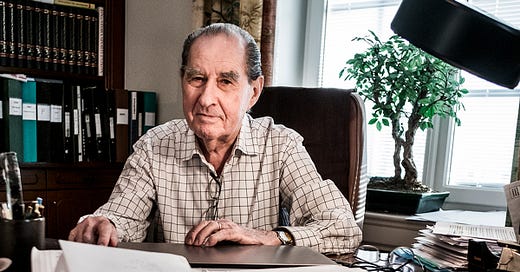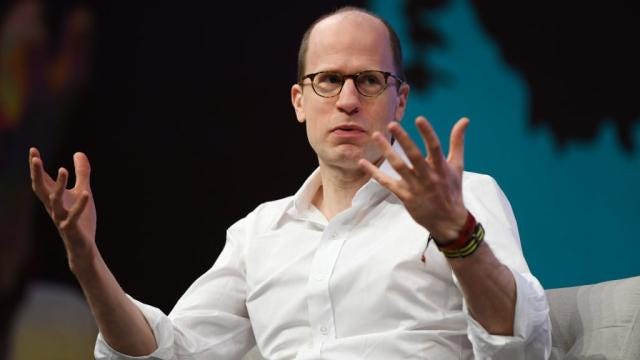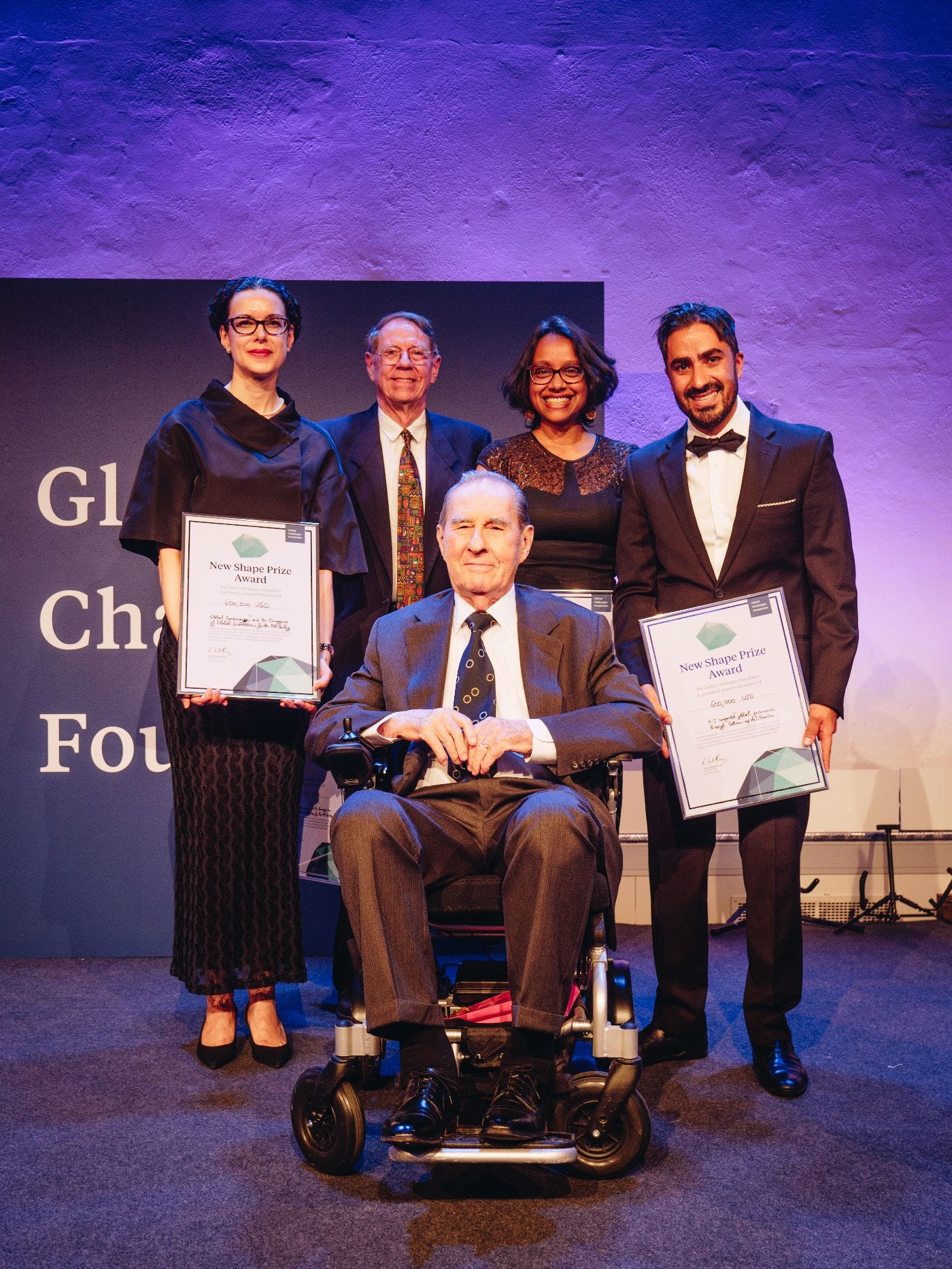Scientific racism, malthusian elitism, and dangerous techno-utopian ideas
Safeguarding future generations by averting existential dysgenic risks
Global Challenges Foundation, together with Stimson Institute, has played a prominent role in the preparations for the historic United Nations meeting Summit of the Future in September. This summit is expected to produce the outcome document Pact for the Future, giving extensive authority to United Nations in case of a major global crisis. Behind the benevolent-sounding motives hides scientific racism, malthusian elitism, and dangerous techno-utopian ideas about safeguarding the future with high-tech surveillance.
Laszlo Szombatfalvy
Global Challenges Foundation was founded by Swedish-Hungarian financier Laszlo Szombatfalvy in March 2013. Laszlo, a magician/illusionist by profession, had fled to Sweden after the Hungarian Uprising in 1956. He studied business economics and after a few years, he began to work at Shell Oil’s Swedish finance department. But as he wanted to use his magic skills more efficiently, he used his spare time to learn how the stock market worked and developed a method of risk calculation for investments. In 1971, after twelve years at Shell, he quit his job and started his third career as an investor.
Szombatfalvy became a stock market wizard. With his “magic powers” he was able to grow his modest savings of 6,000 SEK into a fortune. His speciality was real estate companies, and he would, during the eighties, become the most successful investors in Sweden. His fortune was to a major extent invested in the Swedish commercial building real estate giant Castellum.
His skills gave him new friends within the Swedish investment community. He became a "non-editorial contributor" to the business magazine Affärsvärlden in 1973, after contacting their stock market commentator Björn Franzon (later the vice President at The Fourth Swedish National Pension Fund), and was a part-owner of Alfred Berg Asset Management, where he became friends with the CEOs Christer Jacobsson and billionaire investor Patrik Brummer.1
His risk assessments were also applied to the larger processes and challenges of the planet. Early on he became an advocate for a world government to solve humanity’s problems. At first he thought it was necessary due to the threat of nuclear war. In the words of his friend Anders Wijkman (president of the Club of Rome’s 2012–2018):
About 30 years ago, my phone rang. I was working with the Red Cross and the person who phoned was László Szombatfalvy. You can imagine my surprise when he told me what he planned. “I want to help finance a film to arouse opinion against nuclear weapons and to promote a new world order”.
Other global challenges in the need of management were also added to the list. In 2009, he summarised his ideas in the book The Greatest Challenges of Our Time. His philosophy resembled those of Wijkman’s Club of Rome, with the population explosion combined with rising living standards as a perceived catalyst to catastrophic climate change and other environmental disasters.
Szombatfalvy wrote opinion pieces together with Wijkman about the “population problem”, and later donated money to the Overpopulation Project, with its motto: “Too Many People Consuming Too Much”.2 One of their prescribed solutions was to:
Create a new global treaty to end population growth, with all countries choosing population targets every half decade with a plan on how to achieve them.
According to Szombatfalvy, the world was in need of a “political global organization with understanding, power and authority to tackle these problems”, and added that it was “important that the new system does not require that all nations must be democratic in the western sense of the word”.3
In 2012, he set his plans in motion. About half of his fortune (SEK 500 million) was donated to Global Challenges Foundation at its founding, with the mission of developing “improved global decision-making models” to handle global risks.
Some of his friends from the investment community were recruited as board of directors, including Christer Jacobson, Björn Franzon, and Rockefeller Foundations senior advisor, Mats Andersson (president at The Fourth Swedish National Pension Fund), as well as the director of Stockholm Resilience Centre, Johan Rockström and the former EU commissioner Margot Wallström (A Social Democrat who later became Swedish Foreign Minister) as spokesperson.
Johan Rockström, an agronomist who had been handpicked by IPCCs former chairman Bert Bolin to lead the Stockholm Environment Institute in 2003, would guide the foundation with his framework of planetary boundaries and predictions of tipping points that could trigger dire cascading effects.4 In 2011, he authored the book Bankrupting Nature: Denying our Planetary Boundaries (Den stora förnekelsen) with Anders Wijkman, published as a report to the Club of Rome in 2012. This constituted “The Science”.
Rockström and Wijkman were the “Brothers of Doom”, and Rockström would assume the position as a prominent and trusted scientific advisor to the world’s political and economic elites. His visits to WEFs meeting in Davos, United Nations in New York, and the never-ending cycle of Climate Change Conferences would become frequent.
Former Social Democrat politician and television anchor Jens Orback was appointed executive director. Global Challenges Foundation also started a collaboration with Stockholm School of Economics to educate students about “urgent and large-scale problems of modern times”.5
Nick Bostrom and the Global Catastrophic Risks
In February 2015, they issued their first Global Catastrophic Risks report, authored by project manager Dennis Pamlin, previously Global Policy Advisor for WWF, and Dr Stuart Armstrong, research fellow at Oxford Martin School’s Future of Humanity Institute.
The report was built upon Szombatfalvy’s ideas and Future of Humanity’s groundbreaking work on global catastrophic risks. Their director, Swedish philosopher Nick Bostrom (Niklas Boström), played a “particularly important role”, whereas Johan Rockström “provided important input regarding structure and methodology”.
Bostrom had introduced the concept of “existential risks” in 2002, and was the editor of the book Global Catastrophic Risks, which listed risks like “artificial general intelligence, biological warfare, nuclear warfare, nanotechnology, anthropogenic climate change, global warming, stable global totalitarianism, as well as methods for predicting and managing catastrophes”.

Future of Humanity was a futurist research institute, founded in 2005 by Bostrom. He had as a graduate student during the 90s, at the London School of Economics, become inspired by philosophies deriving from the Extropy Institute in California about directing human evolution, eradicating diseases and bringing about a future utopia with eternal life spans using technology. One of their more outlandish ideas was to upload minds into supercomputers, and bring about a posthuman existence.6
Boström, that founded World Transhumanist Association in 1998 (renamed Humanity+ in 2004), has since become one of the most prominent transhuman philosophers, authoring books like Human Enhancement and Superintelligence. The latter was praised by Bill Gates and Elon Musk.
His institute started out with the EU-funded ENHANCE project, which explored the social and ethical impact of human enhancement, and developed into a playground for the transhumanist cult, funded by tech billionaires with corresponding outlandish sci-fi fantasies.
In 2005 Bostrom formulated the “Singleton hypothesis”, which means “a world order in which there is a single decision-making agency at the highest level”. The Singleton would have:
(1) the ability to prevent any threats (internal or external) to its own existence and supremacy, and (2) the ability to exert effective control over major features of its domain (including taxation and territorial allocation).7
These ideas was obviously music to the ears of the rich and powerful. Global Challenges Foundation embraced this and later hired transhumanist Waldemar Ingdahl, member of Humanity+, as their communication officer.
Longtermism
Bostrom is viewed as the founding father of longtermism, an ethical view that promotes the safeguarding of future generations by averting existential risks. A techno-utopian ideology, with resemblance to Isaac Asimov’s fictitious “psychohistory”, that has come to permeate both Global Challenges Foundation, and the United Nations futures agenda (as expressed in Our Common Agenda).
In Bostrom’s view this could justify to “establish some kind of surveillance and enforcement mechanism that would make it possible to interdict attempts to carry out a destructive act.”8 That could be the Singleton. No wonder Bostrom was invited to the 2019 Bilderberg meeting (together with Rockström) to discuss a “A Stable Strategic Order” and “The Ethics of Artificial Intelligence”.9
In the second half of 2015, United Nations 17 Sustainable Development Goals (Agenda 2030) and the Paris Agreement on the climate were adopted by the member states. In early 2016, World Economic Forum and chairman Klaus Schwab declared the transhuman and technocratic Fourth Industrial Revolution.
The stage was set to make the next move.
The New Shape Prize
In 2016, Global Challenges Foundation and Laszlo Szombatfalvy launched the competition “A New Shape Prize” with the goal to promote “new decision-making structures that could galvanise effective international action to tackle global catastrophic risks”.
The winners would receive 5 million USD. The interest was huge and 2,702 entries from 122 countries were sent to the competition between November 2016 to September 2017.10
At the World Economic Forum annual meeting in Davos in January 2018, Johan Rockström stated that:
The New Shape Prize is the first ever attempt to invite the whole world to come up with the best possible innovative ideas of how we can find a New World Order, a global governance pathway that will enable us to transition into a desired future there we avoid potentially global catastrophic risks, ranging from the risk of nuclear war, pandemics, inequality, all the down to climate system collapse.
During the same meeting, Johan declared, with references to the WEF's own Global Risks Report, that a coalition of leading technology companies, engineers and entrepreneurs would come together to become stewards of the planet and lead the world towards a zero carbon future.11
The jury considered that none of the proposals met all the competition criteria, and instead awarded three winners to share the prize money.
Among these were “Global Governance and the Emergence of Global Institutions for the 21st Century”, with a proposal including a revised UN Charter, a World Parliament and a second civil society-focused chamber.
This proposal was to become a blueprint for the new global order. The winners would play a major part in the next part of this story, with Rockström taking the position as co-chair of The Climate Governance Commission and Anders Wijkman serving as an expert. Rockströms rise to stardom would continue as joint director of the Potsdam Institute of Climate Impact in 2018.
The closure of the Future of Humanity Institute
Bostrom seems, however, to have lost his usefulness to the ruling elites. Or maybe the ideas transpiring from his transhumanist madhouse has become too embarrassing?
Due to rising tensions with Oxford’s faculty of philosophy Future of Humanity Institute closed its operations on 16 April 2024. In 2020, the Faculty put an end to fundraising and hiring, whereas it was decided that the contracts of the remaining FHI staff would not be renewed at the end of 2023.12 This was preceded by a couple of scandals within the longtermism community. The final straw was a message from the Extropian mailing list, that resurfaced after nearly two decades, in which Bostrom had claimed that, based on what he had read, "blacks are dumber than whites".
Bostrom wrote in his apology that “somebody has been digging through the archives of the Extropians listserv with a view towards finding embarrassing materials…”13
The total surveillance society that records everything, and which he had discussed in his articles and books, ironically came back to bite him in his behind.
The person who found Bostrom’s 1996 discussion group message was a former fellow adherent of longterminism, Émile Torres, who had turned against the techno-utopian ideas, branding them as dangerous.14
He also pointed out that Bostrom, in his groundbreaking article Existential Risks (published 2002 in the Journal of Evolution and Technology), had listed “dysgenic pressures” as an existential threat. This is the idea that stupid people might outbreed smart people, resulting in a general dumbing down of the population (like in the movie Idiocracy).
If such selection were to operate over a long period of time, we might evolve into a less brainy but more fertile species, homo philoprogenitus.15
Bostrom’s ideas had, according to Torres, its roots in “scientific racism”.16 These views didn’t prevent Bostrom from being invited to play a “particularly important role” in Global Challenges Foundation’s first Global Catastrophic Risk report (and becoming a favourite among the tech billionaires). It is instead highly likely that this was consistent with the Malthusian ideals that permeates Global Challenges Foundation, and their pursuit for a New Global Order.17
More about that in the next episode.
Bostrom is now a Director of Research at the newly founded Macrostrategy Research Initiative.
di.se/nyheter/aktielegendaren-laszlo-szombatfalvy-har-avlidit/
bt.se/debatt/hur-manga-manniskor-tal-jorden/
globalchallenges.org//app/uploads/2023/06/The-Greatest-Challenges-of-Our-Time-2009.pdf
stockholmresilience.org/research/planetary-boundaries.html; In 2007 the Stockholm Resilience Centre had been launched with the purpose to “addressing the complex challenges facing humanity”, with Rockström as its director.
hhs.se/globalchallenges
Among its directors and advisors were futurist Ray Kurzweil, AI pioneer Marvin Minsky and Max More.
nickbostrom.com/fut/singleton
nickbostrom.com/papers/vulnerable.pdf
bilderbergmeetings.org/meetings/meeting-2019/participants-2019
iefworld.org/node/925
www.weforum.org/agenda/2018/01/how-we-can-direct-the-fourth-industrial-revolution-towards-a-zero-carbon-future/
static1.squarespace.com/static/660e95991cf0293c2463bcc8/t/661a3fc3cecceb2b8ffce80d/1712996303164/FHI+Final+Report.pdf
theguardian.com/technology/2024/apr/28/nick-bostrom-controversial-future-of-humanity-institute-closure-longtermism-affective-altruism
nickbostrom.com/oldemail.pdf
truthdig.com/articles/nick-bostrom-longtermism-and-the-eternal-return-of-eugenics-2/
nickbostrom.com/existential/risks
https://www.truthdig.com/articles/nick-bostrom-longtermism-and-the-eternal-return-of-eugenics-2/
svd.se/a/be4598c9-0faa-3834-a3e6-b09ee71deaeb/vi-maste-forsoka-begransa-befolkningsokningen









most valuable work here documented to roll back the curtain and bring into public domain many of the organizations and eminent persons who have been diligently addressing global issues. Nordangard doesn't hide his skepticism about motives but it remains to be seen if his conclusions are correct.. I too am looking for the clues that suggest that the elites are doing all this humanitarian work towards a governable global future for pernicious reasons, in fact to secure a future for the elites alone. But even if I find enough clues, ie statements in writing or on camera, from some, it still does not mean that the bulk of the efforts are nefarious, and not wellmeaning; there will be embedded sociopaths with their own agendas, attempting to subvert the good intentions. Like in magic acts, you succeed by distracting your audience from what is really going on, to pull rabbits out of hats.
Brilliant comprehensive research and analysis as usual from Dr. Nordangard. We are all very indebted to your work. I wonder what the new Macrostrategy Research Initiative will promulgate? More of the same, no doubt. Looking at Bostrom and Rockström's faces, it is really striking how bloodless and cold-hearted they are in a kind of maniacally prohibitive, super repressed sort of way. Reminds me of certain characters and themes from Ingmar Bergman's films. Strange how influential a role Sweden seems to be playing in attempts to finalize a New World Order. Thanks again for unearthing all this for us.